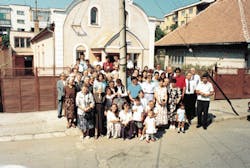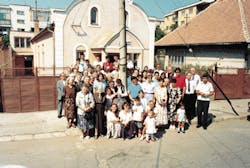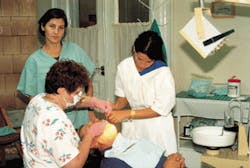Blending into Romania
Hygienist mixes work with vacation, the Old World with the New World, and ice cream with oral hygiene care.
Catherine Milejczak, CDA, RDH, BS
"Welcome to Romania," the flight attendant announced as our plane touched down on the runway. A year of planning and fund-raising had passed. Twenty-four hours of traveling time had also passed. We finally had reached our host country, Romania. A small country about the size
of Oregon, it straddles the Carpathian Mountains and the Transylvanian Alps. Romania is a blend of a modern world and the old country of Europe. It is a blend of big cities with skyscrapers and unspoiled landscape at the foothills of the mountains. It is a blend of city streets clogged with cars and buses and winding rural roads traveled by horse-drawn carts. It is a blend of modern business and fast-food restaurants and Transylvanian castles, medieval villages, and painted monasteries that all add to its beauty. It`s all part of Romania, the old and the new.
So what role does an American hygienist play in all this? Dentistry in Second World countries is often a sadly neglected commodity, and Romania is no exception. I spent my vacation providing dental care to a small community in St. Gheorghe. St. Gheorghe is a Hungarian city located in the Transylvania area of Romania.
I was partnered with a Hungarian doctor and his dental assistant. My husband, Vic, was my assistant. Dentistry in Romania was much like the city itself - a blend of the New World and the Old World. The armamentarium included a blend of ancient equipment and modern items, such as a curing light. The doctor owned a private office but also worked for the government. In the mornings, the dentist did general dentistry, and I assisted. We did fillings, pulpectomies, and extractions. During the afternoons, while the dentist worked at the government office, I did preventive care. The services included scaling, polishing, nutrition counseling and smoking cessation counseling.
Romania had been under Communist power since 1944 before winning its independence in 1989. Since the revolution, the Romanians have suffered economic troubles that have led to great poverty.
Dental hygiene is not a recognized profession in Romania. Dentistry is limited to pain relief. People only visit the dentist when they can no longer endure the discomfort. Most people had never had a dental cleaning. In a country where people can barely afford food, there is no place for luxuries such as dental hygiene. Oral hygiene products are available, but some cannot even afford them. The demand for my services was great. The local dentists, understanding the importance of hygiene, even came for my services.
Our target group for this assignment was a small Hungarian church. In exchange for our service, they adopted us. We stayed with a host family, but different members of the congregation volunteered to feed us our lunch and supper each day. The Romanians, like other Europeans, have a large meal at noon. This plan allowed for us to have a "Sunday dinner" every day. Each family cooked the family favorites and many of the meals cost them a month`s salary to prepare. The families were later reimbursed for their efforts because our meals were included in our fare, but the people did not know that at the time they were preparing the meals. My husband, who is of Polish descent, particularly enjoyed the cuisine. He said it tasted just like his grandmother`s cooking.
While the days at the clinic were long, our visit was not all work and no play. Along with enjoying evening visits with a new family each night, we also participated in Sunday outings with our host families. We toured the city of St. Gheorghe, visited Lake Ann, and toured the natural sulfur spa and underground springs.
The time spent with these families allowed us to learn about their culture and to share ours. Before leaving, we fixed an American meal of barbecued chicken, macaroni salad, and ice cream. Ice cream is one of the unaffordable luxuries for the Romanians. We found that sharing our culture was fun.
Our time passed all too quickly. Having lived and worked with these people daily made leaving very difficult. They gave us souvenir gifts and we left them South Carolina T-shirts and other items from our country. However, these gifts could not surpass the memories that we now have. Taking dentistry to foreign countries is a great way to spend vacation time.
Catherine Milejczak, CDA, RDH, BS, calls Columbia, S.C., home. She can be reached at [email protected].
The author treated members of a church congregation (left) in St. Gheorghe. Below, she offers instructions on oral hygiene on the steps of the clinic.
Milejczak performed dental procedures with the aid of an assistant, Andrea, and an interpreter, Gabi.


